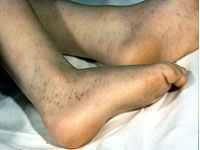In the development of antiphospholipid syndrome, the hereditary predisposition and the presence of bacterial or viral infection plays a major role. The main symptoms of antiphospholipid syndrome are repeated thrombosis.
Content
The concept of antiphospholipid syndrome and pregnancy
Among the reasons for the usual unbearabity of pregnancy, the effect of antibodies (autoimmune reactions) is of particular importance to some natural phospholipids on the processes of implantation, growth, embryo and fetus development, the course of pregnancy and the outcome of birth.
Term «Antiphospholipid syndrome» A group of autoimmune disorders is indicated, characterized by a significant amount of antibodies to phospholipids contained in blood plasma (antiphospholipid antibodies), as well as to those associated with these phospholipids of glycoproteins.
Antiphospholipid syndrome risk factors
One of the factors of antiphospholipid syndrome is a genetic predisposition to this pathology. Another important factor is the presence of a bacterial or viral infection, which does not exclude the possibility of the development of thrombotic complications.
To implement the pathological process, the presence in the body not only antibodies to phospholipids, but also so-called cofactors, when binding to which the true complexes of antigen antibody are formed with. As a result of the action of various factors of the outer and inner media (viral infection, malignant neoplasms, the effect of drugs), the interaction of antiphospholipid antibodies with the cofactors, which leads to serious disorders in the blood coagulation system. In addition, the processes of microcirculation are violated and there is a vascular wall change.
Types of antiphospholipid syndrome
Select primary and secondary antiphospholipid syndrome. The presence of secondary antiphospholipid syndrome is due to autoimmune diseases (with a systemic red lupus, nodule periatheritis, etc.), oncological, infectious diseases, as well as with the impact of a number of drugs and toxic substances. Accordingly, with primary antiphospholipid syndrome, listed diseases and states are missing.
In some cases, the so-called catastrophic antiphospholipid syndrome is isolated, which is characterized by suddenly emerging and rapidly developing insufficiency in the work of important bodies, most often in response to factors such as infectious diseases or operational interventions. The catastrophic antiphospholipid syndrome is manifested by a sharp impaired brain and coronary blood circulation (blood supply to the heart), a stupor (inhibition of consciousness), disorientation, possibly the development of acute renal and adrenal insufficiency, large vessel thrombosis.
Symptoms and complications of the disease
 One of the main and most dangerous manifestations of the disease is often repeated recurrent thrombosis. Venenous thrombosis, localized in deep veins of the heads, which are associated with the risk of dromboembolism of the lung artery branches. However, there are cases of tromboosis of renal and hepatic veins. Thrombotic lesions of the barn, connectible, lower vein hollow, brain vessels, arteries and veins of the retina, large vessels of the lower extremities, various aortic departments. Clinical manifestations of arterial thrombosis are peripheral gangrene, arc syndrome aortic, blindness, brainwater disorders, etc. The danger of thrombotic complications increases with the course of pregnancy and in the postpartum period.
One of the main and most dangerous manifestations of the disease is often repeated recurrent thrombosis. Venenous thrombosis, localized in deep veins of the heads, which are associated with the risk of dromboembolism of the lung artery branches. However, there are cases of tromboosis of renal and hepatic veins. Thrombotic lesions of the barn, connectible, lower vein hollow, brain vessels, arteries and veins of the retina, large vessels of the lower extremities, various aortic departments. Clinical manifestations of arterial thrombosis are peripheral gangrene, arc syndrome aortic, blindness, brainwater disorders, etc. The danger of thrombotic complications increases with the course of pregnancy and in the postpartum period.
It is known that the antiphospholipid syndrome leads to undeveloped pregnancy, the delay of intrauterine growth of the fetus, up to its fetal death in the II and III trimesters. In the first trimester of pregnancy, antiphospholipid antibodies can have a direct damaging effect on a fruit egg with a subsequent spontaneous interruption of pregnancy.
From the early terms of pregnancy, there is an increase in platelet functional activity, the protein-synthesizing and hormonal function of the placenta is reduced. In the absence of appropriate treatment, an increase in the activity of the coagulation system of blood is joined. At the same time, thrombosis arise in placenta vessels, placental insufficiency, chronic hypoxia, and often the fetal death due to lack of oxygen.









